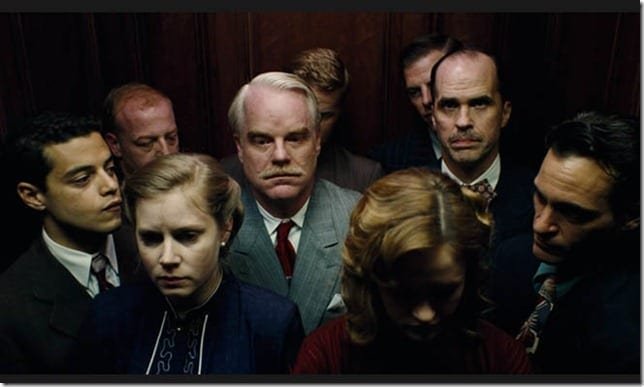 For anyone not intimately familiar with Hubbard’s writing and the early history of Scientology, you should know that almost every word that Hoffman’s Lancaster Dodd speaks in Paul Thomas Anderson’s The Master is either a direct quote or a paraphrase from L Ron Hubbard.
For anyone not intimately familiar with Hubbard’s writing and the early history of Scientology, you should know that almost every word that Hoffman’s Lancaster Dodd speaks in Paul Thomas Anderson’s The Master is either a direct quote or a paraphrase from L Ron Hubbard.
You should also know that the sequence of scenes in this movie follow the early history of Scientology, and the development of its early esoteric technology, almost exactly.
PTA [Paul Thomas Anderson] said that he did not know much about how Scientology exists today, but that he knew a lot about the early history of Scientology. This set me out trying to find out how he knew so much about this – because he has the timeline and locations almost exactly correct – with dates – in the movie. He did say in an NPR interview that he studied “The Aberee”, but he seems to say in the following interview that his father was involved in the early Dianetics movement.
I believe this character represents Forrest Ackerman, Hubbard’s first editor who was involved in the early Dianetics movement.
In some way, I think there is a connection between PTA’s father and Forrie Ackerman, and that PTA heard stories from these guys growing up. Because PTA’s portrayal of Dodd as a greedy, jealous, and insecure person (read the lyrics to the songs the characters break into for “Don’t Sit Under the Apple Tree with Anyone Else But Me” and “Get You on a Slow Boat to China”) show a very deep insight into L Ron Hubbard.
These insightful character traits that PTA creates for Lancaster Dodd explain to me why Hubbard did almost everything he did in Scientology – from Scientology’s socially coercive influence techniques, to the strict ideological environment he developed, to Scientology’s operand conditioning techniques and everything else that makes “standard” Scientology what it is today under David Miscavige.
But maybe I’m wrong about all this, and this post is simply what I myself bring to this particular cinematic tour de force.
All in all, as an Ex-Scientologist, this movie was a truly cathartic work of art for me. And I very much appreciate Paul Thomas Anderson’s artistic genius in creating it.
Further thoughts on The Master:
- Lead character name: “Freddie Quell”. That character seems like the most “aberrated” person the writer could imagine. “Quell”, of course, means “suppress”
- Each song a character sings in the movie has a running theme throughout – picked for the time setting and for the artistic comment on the subject matter. Look up and read the lyrics for an insight into the writer’s thematic message.
- Mary Sue was depicted as even more devoted and fanatical than L Ron Hubbard, which many people who knew her have also commented on. As a CMO messenger Janis Grady recently has written who knew them both, the Guardian’s Office was Mary Sue’s, while the Sea Org was Ron’s.
- At the Phoenix conference for “Book 2” Laura Dern’s character points out one of Dodd’s first contradictions as he developed the technology, which made him blow up at her in the movie. The same contradiction exists in the development of the technology of Dianetics and Scientology – at the same time as depicted in the movie.
- All the TRs, Upper Indoc TRs and Objective processes in the movie are delivered 100% standardly – except for the long scene where Freddie Quell is run by Dodd on “Look at that Wall, Thank you, walk over to that wall” while Dodd and his family eat dinner outside on the porch. But who knows, maybe Hubbard ran his pcs like that for really long and boring processes designed to break his subjects like a horse.
- The strip mall in Phoenix where the org was located at that time looks exactly like the location they used in the movie where Freddie beats up the Editor. In fact, the conversation they have just before this, in the room with the checkered tile floor and folding tables with printing presses for PABs, looks exactly like a “past life incident” I ran in the 90’s where I was receiving auditing “last lifetime” in 1954 on the Professional Course in Phoenix. That shit freaked me out for weeks after watching this movie in 2012.

I have not seen the movie so I can’t provide a rebuttal, opinion, or anything from experience.
Seen it 4 times. Own the Blu-ray.
There is a scene where Freddie runs an incident in auditing which is the best depiction of the experience I have ever seen.
ok, I’ll watch it. I tried today to watch it, but not available on my internet cable services. I’ll try again on Hulu.
A lot of people don’t like it. It relies on many different cinematic devices to tell the story. It’s not really a straight narrative.
But there are many layers and multiple dimensions to the movie. It’s lots of fun to deconstruct.
It’s excellent. 15 of us went and saw it when it came out.
What’s the deal with ESMB, Claire?
You got any skinny?